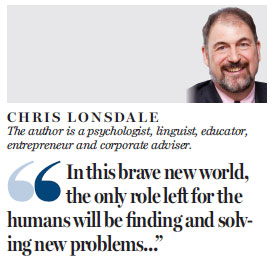Education should help children get practical and marketable skills
Updated: 2016-08-03 07:42
By Chris Lonsdale(HK Edition)
|
|||||||||
A couple of weeks ago I delivered a TEDx presentation in China, addressing the issue of how to build real skills and get good exam grades. The reason for this topic, of course, is the general orientation in Hong Kong and other parts of Asia to focus on exam results to the exclusion of real, useful and marketable skills.
The biggest applause came when I suggested that children should get enough sleep in order to do well at school. The teenagers in the audience obviously struggle with daily sleep deprivation in pursuit of their holy grail. In the pursuit of top exam scores, children are giving up more than just their free time. They are damaging their health, and their minds! Rather than free thinkers who are able to solve problems and create new values in the world, the average product of our educational system today is an exam zombie trained to learn by rote, to tick the boxes, and to tell examiners/teachers/bosses what they want to hear!
And, of course, this approach to education by no means ensures that students can even pass the exams they take. This year's Diploma of Secondary Education Exam in Hong Kong resulted in a failure rate of 57.8 percent. Children spend up to 20 percent of their lifespan in a system that makes them a failure before they are out of their teens. Some might call that insane.
This is not the sort of educational outcome that should be desired in a world where robots do all the menial work. In 20 years, there won't be many driving jobs, manual factory jobs, or even legal assistant jobs. All of the boring, repetitive stuff will be done by machines. Remember that self-drive cars are already here, and that wide adoption is now only a few years away.
In this brave new world, the only role left for the humans will be finding and solving new problems, with ever-increasing levels of creativity and insight. To prepare for this challenge, an educational system originally designed to populate factories in the late 1800s is clearly not a model we want to be using. If education is to maintain any relevance at all, we need to do something very different.
The change that will have the biggest impact is simply a change in how people connected to education think about what exams mean. We need to stop treating a measure as if it were the goal. Because, when the measure becomes the goal, everything goes off track. As a simple example, I have received letters from young people wanting to learn English which say, in effect, "I don't have time to learn English so I can use it, because I am too busy preparing for my English exams, and teachers are forcing me to learn stuff that is irrelevant to the use of English."
When children think they can't really learn because exams, and the teacher-driven learning process itself, get in the way, we have a real problem on our hands! In our world today, exam results are no longer considered a measure of some underlying real ability, they are considered to be the ultimate goal itself. In order to achieve this goal of the "perfect exam score", students no longer spend time trying to understand things or master skills that they can use later in the workplace. Rather, they study for the exam, teachers teach for the exam, and parents whip their kids to keep them focused on the exam.
The result? Zombies with degrees. Zombies who are unemployable except for the most menial of roles - which are all disappearing, of course. The system is bent, and to avoid it breaking we need to make some changes. The fundamental change required is actually around how we do testing. The big "winner takes all" approach to standardized one-time exams needs a complete reassessment. The move toward promoting vocational training in Hong Kong is a good step in this direction. Mastery of practical, problem-solving skills creates value that pure academic training is often unable to achieve.
Also, with all the digital tools available in the world today, we should be able to create systems that do regular skill evaluation based on core metrics identified for each discipline, and make these tools part of the ongoing learning and feedback loop - digitally enhanced continuous assessment, if you will. The key, really, is to make ongoing feedback and correction part of both the assessment process and the learning process at the same time. This will ensure that students really learn, because they will always know where they stand, and have the incentive to own their own learning.
If educators truly care about preparing their proteges for the future, the only question worthy of an answer is, "When do I start making this change?"

(HK Edition 08/03/2016 page11)